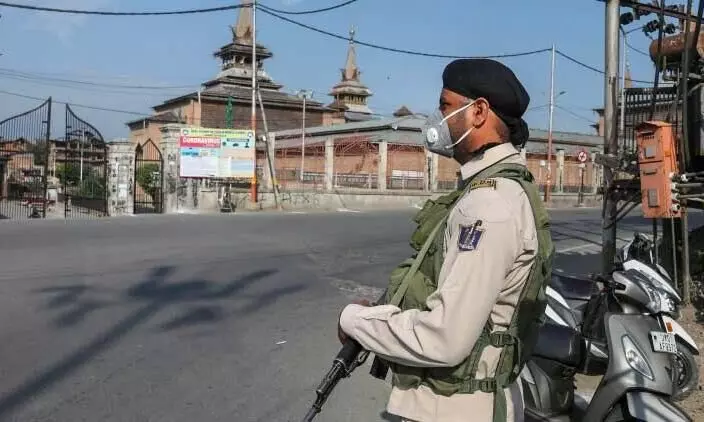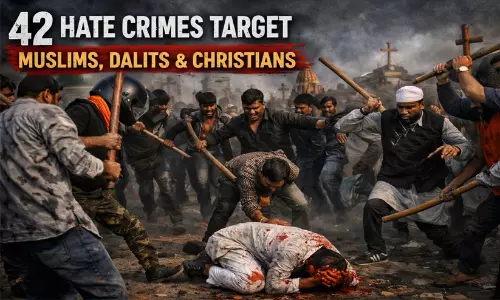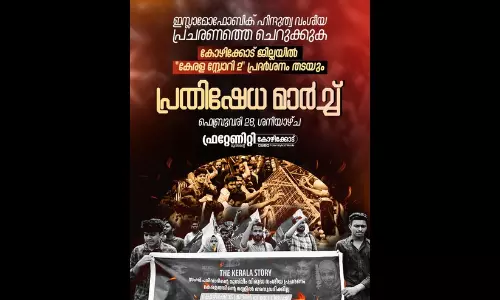

Where is that Kashmir now?
text_fieldsThe Lieutenant Governor administration in Kashmir announced imposition of curfew in Srinagar on August 4 and 5, to prevent protests. Last year, on August 5, the government led by Narendra Modi read down Articles 370 and 35 A to end the semi-autonomous status of Jammu and Kashmir and bifurcate it into two Union Territories. The pro-Independence Hurriyat Conference and pro-India People's Democratic Party (PDP) have declared to observe August 5 as "Black Day". With unprecedented curbs on the use of internet, restrictions on inter-district movement due to Covid-19 pandamic and detention of hundreds of people, there is no likelihood of any flare-up but the imposition of curfew demonstrates the"achievement" of the government during this tumultuous year.
Home Minister Amit Shah had projected the constitutional change in the embattled state as a move that would bring development and peace to Kashmir. A year down the line, anything but peace and development is seen in Kashmir. Almost every aspect of Kashmir's life, from culture to politics, is disturbed. Incidents of violence have increased, the economy has slowed down, and the normal life has become a tale of the past.
On the security front, the security forces killed nearly 140 militants including operational chiefs of four known groups. The Special Director General of CRPF Zulfiqar Hassan says the security forces have gained an upper hand over the militants, especially in the south Kashmir districts of Anantnag, Kulgam, Pulwama and Shopian. These areas have been the focus of security operations. General officer commanding of south-Kashmir-based Victor Force Major General A Sengupta says that around 14,000 to 15,000 operations are carried out in a month.
Despite the offensive, militants have been able to carry out high profile attacks. While 70 youngsters took up arms, the militants continued their actions on security forces. In two separate gunfights in north Kashmir, a Colonel, a Major, a police officer, and five elite para commandos were killed. Militants also carried out an attack on a BJP functionary in Bandipora, killing him and his father and brother.The government miserably failed to initiate any political process. The separatists of all hues are behind bars, a process that had begun much before the abrogation of 370. Most of them are languishing in jails outside J&K and despite advisories on releasing them due to Covid-19, the government does not relent. However, there was some leniency on the pro-India political leaders like Dr Farooq Abdullah, his son Omar Abdullah and People's Conference leader Sajjad Lone whose detention was quashed. Former Union Minister Saifuddin Soz accused the administration of telling lies to the Supreme Court as he was disallowed by the police guard at his residence to venture out. The SC was earlier told by the LG administration that Soz was a "freeman". Mehbooba Mufti's detention order was extended by three months as she refused to sign a bond to declare she would not talk on political matters, read article 370 abrogation. The gag on the media has been unprecedented. The newspapers write everything but the ground situation. The editorials on sensitive issues are missing. The administration introduced a media policy that gives the authority to regulate the content of newspapers. There was no organised protest against the policy. With the local media gagged, and journalists often called for questioning by the police, the reporting from Kashmir has become very difficult.
Shah had declared that the abrogation of article 370 would result in in streamlining the administrative set-up. It has worsened though. Various commissions set up by the erstwhile governments including the Jammu and Kashmir State Human Rights Commission, and the Women's Commission do not exist now. The chaos is palpable. The plight of children is unimaginable. In the past year, children have attended school for just 10 school days. It is taking a heavy toll on their psychological well-being. There are already incidents of teenagers committing suicide. With only low-speed internet available, the online education has become a farce.
The economy of J&K is the worst hit. Shaikh Ashiq,chairman Kashmir Chamber of Commerce and Industries (KCCI) says that Jammu and Kashmir has lost Rs. 40,000 Crore during past one year due to the government-imposed clampdown and due to the lockdown related to the pandemic. He said this huge loss to the Kashmir economy has increased unemployment further and the situation has forced big as well as small business units to make job cuts.
However,the government continued with its agenda to alter the basic administrative structure. The domicile law was introduced and implemented which enables people from outside Jammu and Kashmir to adopt citizenship rights, which were barred in the past. An IAS officer from Bihar, Navin Chowdhary, who has been serving in J&K for 35 years, publicized his "domicile certificate". A refrain in Kashmir is that such moves are aimed at changing the demography of J&K and reducing the Muslim majority to a powerless and politically deprived minority. A series of administrative orders is gradually disempowering the local people from their rights to employment, owning movable and immovable properties and having political sway.
Notwithstanding the jackboot policy inside Kashmir, the government continued to draw flak for its policy at the international level. The things took a worse turn, after the Chinese PLA advanced in estern Ladakh region and occupied large swathes of land in May. Experts say the Chinese Aggression is linked to the constitutional changes in Jammu and Kashmir. While the relations with Pakistan are at its lowest ebb, the Chinese incursion could be a trigger for a two-front war. The common Kashmiris have not expressed themselves overtly during the past one year. They feel hurt, humiliated and betrayed. They protested with their silence and continue to do so. Over the 70 years, the Indian state had created a large constituency in the form of mainstream political class but the abrogation of article 370 consigned this class to the dustbin. They have nothing to offer to the people. When Omar Abdullah obliquely declared that restoration of statehood could be a starting point, he was hauled over coals and dissenting voices emerged from his own party.
This state of affairs in Kashmir may help BJP and its Hindutva agenda, which thrives on anti-Muslim policies but it is deeply hurting the idea of India. There is no solution in sight to save this idea of India.
(The author is a senior journalist )





















